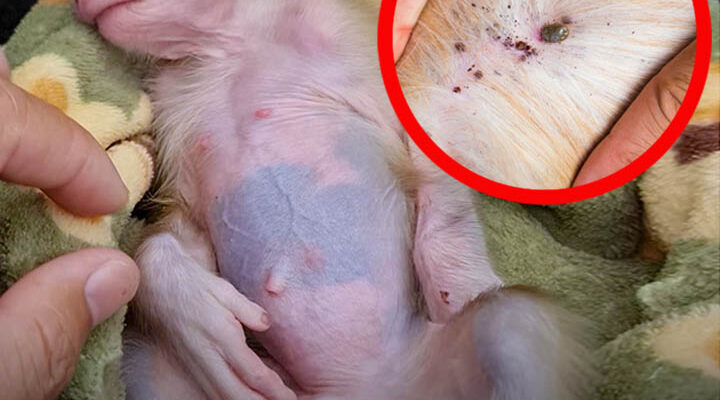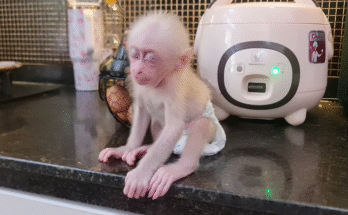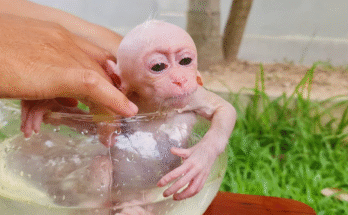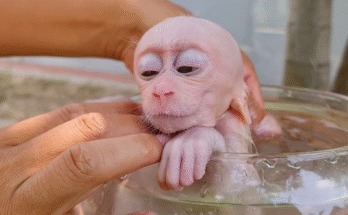How to Protect Newborn Monkeys from Dog Fleas
Dog fleas can pose a serious threat to the health of newborn monkeys, as these parasites can cause discomfort, itching, and even infections. To safeguard a newborn monkey from dog fleas, preventative measures and hygiene practices are crucial.
Start by ensuring the monkey’s living area is clean and flea-free. Regularly clean bedding, toys, and other items with hot water to kill fleas and their eggs. Use a safe insecticidal spray or natural flea repellents, such as diatomaceous earth or diluted lemon sprays, to treat the area.
If the newborn monkey has been exposed to fleas, consult a veterinarian immediately. They may recommend a gentle, monkey-safe flea treatment, such as specially formulated shampoos or sprays, to remove fleas without harming the baby monkey. Avoid using harsh chemicals or treatments meant for dogs or cats, as these can be toxic to monkeys.
Preventive care is key. Limit the monkey’s exposure to stray dogs or other animals that might carry fleas. Use flea collars or natural repellents on animals in the area to reduce the risk of transfer.
By maintaining a clean environment and taking proactive steps, you can effectively protect a newborn monkey from the dangers of dog fleas.
How to Protect Newborn Monkeys from Dog Fleas
Dog fleas can be a significant threat to newborn monkeys, especially given their fragile immune systems and delicate skin. These parasites not only cause itching and discomfort but can also lead to serious infections or diseases if left unchecked. Protecting newborn monkeys from dog fleas requires a combination of preventative measures, proper hygiene, and professional care. Here is a comprehensive guide to help keep newborn monkeys safe from dog fleas:
1. Maintain a Clean Environment
A clean living environment is the first line of defense against fleas. Fleas thrive in warm, humid, and dirty spaces, so it is essential to regularly clean and sanitize the monkey’s surroundings.
- Clean Bedding: Wash all bedding, blankets, and soft toys with hot water to kill any fleas or eggs. Do this at least once a week.
- Sanitize Living Areas: Use a vacuum cleaner to remove dirt, hair, and potential flea eggs from floors, carpets, and furniture. Follow up with a pet-safe disinfectant or flea spray.
- Treat the Surroundings: Sprinkle diatomaceous earth or use natural flea-repellent sprays around the area. Ensure these are non-toxic and safe for newborn monkeys.
2. Limit Exposure to Flea-Carrying Animals
Stray dogs, cats, and even other wild animals can carry fleas. Limiting a newborn monkey’s exposure to these animals is critical.
- Separate the Monkey: Keep the newborn monkey in a secure, enclosed area away from dogs or other animals that may carry fleas.
- Flea Treatment for Other Animals: If you have pets or other animals in the area, ensure they are treated with flea preventatives such as collars, shampoos, or spot-on treatments.
3. Regular Grooming and Inspection
Inspecting the newborn monkey for signs of fleas can help detect an infestation early. Look for excessive scratching, red bumps, or flea dirt (black specks) on the monkey’s skin.
- Grooming: Use a soft-bristle brush or flea comb to gently groom the monkey. This helps remove fleas and their eggs while keeping the monkey comfortable.
- Bathing: If fleas are detected, consult a veterinarian for a gentle, monkey-safe shampoo. Avoid harsh chemicals, as a newborn’s skin is highly sensitive.
4. Use Natural Flea Deterrents
Natural remedies can be effective in repelling fleas without exposing the monkey to harmful chemicals.
- Essential Oils: Lightly spray diluted lavender, eucalyptus, or lemongrass oil around the area (but not directly on the monkey).
- Lemon Spray: Boil sliced lemons in water, let it cool, and use the solution as a spray for the living area. Lemon’s acidic properties repel fleas.
- Diatomaceous Earth: This natural powder dehydrates fleas and their eggs. Sprinkle it lightly on carpets or bedding, then vacuum after a few hours.
5. Consult a Veterinarian
If fleas persist or the monkey shows signs of distress, consult a veterinarian immediately. They can provide monkey-safe flea treatments or medications tailored to the monkey’s age and health.
- Flea Medication: Some topical or oral medications may be safe for young monkeys but always follow a vet’s advice.
- Skin Treatment: If the monkey has skin irritation or infections from flea bites, a vet can recommend soothing ointments or antibiotics.
6. Prevent Future Infestations
Once fleas are removed, focus on preventing future infestations.
- Regular Cleaning: Continue cleaning and treating the living environment to prevent flea eggs from hatching.
- Monitor Other Animals: Regularly treat pets or other animals in the area with flea preventatives.
- Seasonal Protection: Fleas are more active in warm months, so increase preventative measures during these periods.
Final Thoughts
Protecting a newborn monkey from dog fleas requires diligence and proactive care. By maintaining a clean environment, limiting exposure to flea-carrying animals, using natural deterrents, and seeking veterinary assistance when needed, you can ensure the monkey grows up healthy and safe. These efforts not only protect the monkey but also create a harmonious living space free from the discomfort and dangers of fleas. Always prioritize gentle, non-toxic methods to protect the newborn’s delicate health.
How Does This Little Monkey Really Feel?
How to Properly Care for and Bathe a Baby Monkey
Caring for a baby monkey requires patience and proper knowledge. Ensure they are in a clean, safe, and comfortable environment. Feeding them a nutritious diet is essential for their growth and health. Bathing a baby monkey should be gentle and done with lukewarm water. Use mild, monkey-safe soap to avoid skin irritation. Be cautious not to get water into their eyes, ears, or nose. After bathing, dry them gently with a soft towel and keep them warm to prevent colds. Regular grooming and care help them stay healthy and bond with you. Proper care ensures their happiness and well-being.
Caring for a baby monkey is a rewarding yet challenging responsibility. These intelligent and sensitive creatures require specialized care to thrive. Below is a detailed guide on how to properly care for and bathe a baby monkey, ensuring their health, safety, and happiness.
1. Create a Safe and Comfortable Environment
A baby monkey needs a clean, warm, and secure living space. Here’s how to set up the perfect environment:
- Housing: Use a sturdy enclosure with no sharp edges or gaps to prevent injury or escape. Include soft bedding such as blankets or towels for comfort.
- Temperature Control: Keep the area warm, especially if the monkey is very young. Use a heating pad or lamp to maintain a temperature of 75-85°F (24-29°C).
- Toys and Enrichment: Provide toys, ropes, and climbing structures to stimulate their natural instincts and keep them entertained.
2. Nutrition and Feeding
Proper nutrition is crucial for a baby monkey’s development.
- Milk Replacement: For newborns, use a veterinarian-approved monkey milk formula. Do not use cow’s milk as it can cause digestive issues.
- Transition to Solids: As the monkey grows, introduce soft fruits like bananas, apples, and papayas. Gradually add vegetables and protein sources, such as boiled eggs or monkey-specific pellets.
- Hydration: Ensure the monkey has constant access to clean drinking water.
3. Bathing a Baby Monkey
Bathing a baby monkey requires care and patience to ensure the process is safe and stress-free.
Step-by-Step Bathing Guide:
- Prepare the Bath:
- Fill a small basin or sink with lukewarm water (about 98°F or 37°C).
- Use monkey-safe shampoo or mild baby shampoo to prevent skin irritation.
- Introduce the Monkey to Water:
- Hold the monkey gently and let them feel the water with their hands or feet to reduce anxiety.
- Speak softly to reassure them throughout the process.
- Clean Gently:
- Wet the monkey’s body with your hand or a soft cloth. Avoid splashing water.
- Lather the shampoo gently, focusing on areas like the hands, feet, and tail. Be cautious around the face.
- Rinse Thoroughly:
- Use clean, lukewarm water to rinse off all soap. Ensure no residue is left, as it can irritate their skin.
- Dry Carefully:
- Wrap the monkey in a soft, dry towel and pat them dry.
- Keep them warm after the bath to prevent colds. You can use a low-heat hairdryer at a safe distance if needed.
4. Health and Hygiene
- Regular Checkups: Schedule routine visits with a veterinarian experienced in primates to monitor the monkey’s health.
- Parasite Control: Use vet-recommended treatments for fleas, ticks, and worms.
- Vaccinations: Ensure they receive necessary vaccinations to protect against diseases.
- Grooming: Brush their fur regularly to keep it clean and reduce shedding.
5. Socialization and Bonding
Monkeys are social animals and thrive on interaction. Spend time playing, cuddling, and talking to them to build trust and a strong bond. Expose them to various sounds, environments, and people to improve their adaptability.
6. Behavioral Training
Teaching basic commands and positive behaviors early on is essential. Use reward-based training to encourage good habits and discourage undesirable actions like biting or excessive noise.
7. Safety Precautions
- Never leave a baby monkey unattended, especially near water or hazardous objects.
- Keep electrical cords, toxic plants, and small items out of reach to prevent accidents.
- Always supervise interactions with other pets or children.
8. Signs of a Healthy Baby Monkey
Monitor your monkey for signs of good health:
- Bright, alert eyes
- Smooth, shiny fur
- Active and playful behavior
- Regular appetite and bowel movements
If you notice lethargy, loss of appetite, or other unusual behaviors, consult a veterinarian immediately.
Conclusion
Proper care and bathing are critical for the well-being of a baby monkey. By following these steps, you can ensure they grow up healthy, happy, and well-adjusted. Remember, owning a monkey is a long-term commitment that requires dedication and love. Always prioritize their needs and consult professionals when necessary to provide the best care possible.
Don’t Throw the Baby Out with the Bathwater: A Monkey’s Bathing Secret
How to Bathe a Newborn Monkey Without Tears
Bathing a newborn monkey can be challenging, especially when they cry intensely. To ensure a smooth and tear-free experience, start by creating a calm environment. Use warm water at a comfortable temperature, as monkeys are sensitive to cold. Gently hold the baby monkey, ensuring they feel secure and supported. Use a soft cloth to clean their delicate skin without harsh scrubbing. Keep the session short to avoid overstimulation. Singing or speaking softly can help soothe them. After the bath, wrap them in a warm towel and provide gentle cuddles. With these methods, bathtime becomes a relaxing bonding experience.



